The world of business in the United Kingdom and Ireland shows interesting similarities and differences. In London’s busy streets and Dublin’s lively areas, businesses grow. They are shaped by the unique history and culture of each country. In this article, we explore the business cultures of the UK and Ireland. We look at how these cultures affect their business worlds. This is useful for anyone interested in the mix of business and culture in these places.
Key Takeaways
- Insight into how historical ties shape modern UK and Ireland business comparison.
- Understanding the distinct corporate cultures as part of the broader cross-cultural analysis.
- Recognition of how cultural values and norms influence business practices in UK vs. Ireland corporate culture.
- A discerning look at legal and regulatory differences that impact businesses in both regions.
- Appreciation of the unique challenges and opportunities present in the UK and Irish markets.
Overview of UK and Irish Business Landscapes
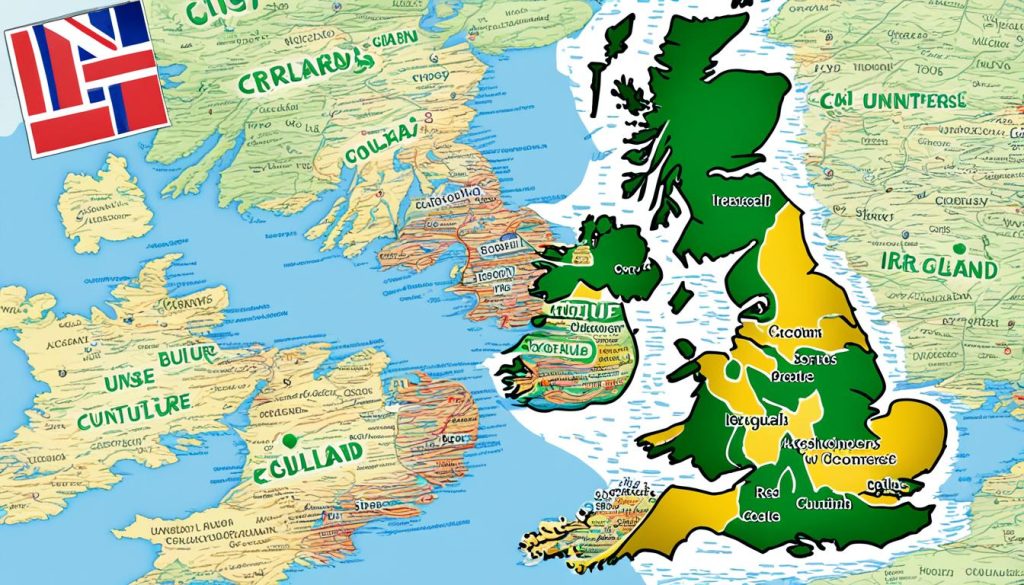
The UK business environment and Irish business landscape stand out in Europe. They offer unique benefits. The UK shines as a leader in finance, tech, and creative fields, thanks to London. It mixes a buzzing start-up scene with big companies in a rich trade history.
In contrast, Ireland excels with tech and pharma giants. This is due to good tax rates and a skilled, English-speaking workforce. After Brexit, it has become a key entry point to the EU for many firms.
Comparing the UK and Ireland shows different challenges and opportunities after Brexit. The UK is working on new trade deals and economic ties. Meanwhile, Ireland enjoys steady access to the EU’s market and rules.
The table below shows how the UK and Ireland compare and differ in key aspects:
| Criteria | United Kingdom | Ireland |
|---|---|---|
| Leading Industries | Finance, Technology, Creative Industries | Technology, Pharmaceuticals, Agribusiness |
| Business Climate | Entrepreneurial, Diverse, Open for Trade | Innovative, Growth-Focused, EU-Integrated |
| Workforce Characteristics | Highly Skilled, Multicultural | Highly Skilled, Young Population |
| Regulatory Environment | Post-Brexit Adaptations, Independent of EU Regulations | EU Compliant, Attractive Corporate Tax Rates |
| Economic Health | Stable, Resilient, Competitive on a Global Scale | Robust Growth, High GDP per Capita, Open Economy |
For investors and businesses, understanding the UK business environment and Irish business landscape is vital. The UK’s focus on worldwide partnerships and Ireland’s growth in tech and pharma are key. These factors are shaping their economic stories.
Looking at economic signals, industry strengths, and market access is crucial. For businesses in Europe, these insights can give them an advantage. This is especially true in today’s complex global setting.
Historical Ties Influencing Business Practices
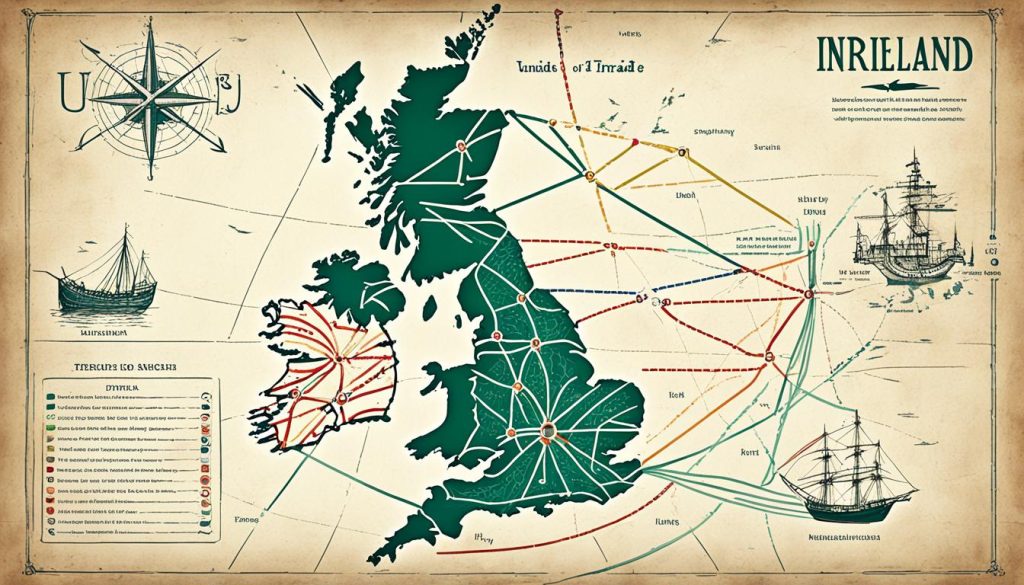
The deep historical ties between the UK and Ireland have shaped their business ways. We can see their shared past reflected in today’s commerce. Understanding this helps us see how business in both countries has developed.
Colonial Legacy and Economic Changes
From colonial times to Ireland gaining independence, their relationship has changed a lot. These changes influenced Ireland’s business methods, including laws and corporate rules, originating from the UK. After independence, Ireland changed its economy, embracing industrialisation and global trade.
Post-Brexit Business Implications
After the UK left the EU, new challenges and chances appeared for UK and Irish businesses. Due to Brexit, both countries had to update their business methods. Now, the UK is looking at global trade, while Ireland benefits from being in the EU.
| Aspect | Pre-Brexit Dynamics | Post-Brexit Adaptations |
|---|---|---|
| Legal and Regulatory Framework | Harmonised within the EU | UK: Independent legislation Ireland: Continuing EU alignment |
| Trade Relations | Free movement within the EU | UK: Seeking global trade deals Ireland: Capitalising on EU single market |
| Market Accessibility | Interlinked UK-Ireland markets | UK: Potential barriers to EU markets Ireland: Unhindered access through EU membership |
| Currency Fluctuations | Stable due to EU expectations | UK & Ireland: Increased volatility and hedging strategies |
Legal and Regulatory Frameworks
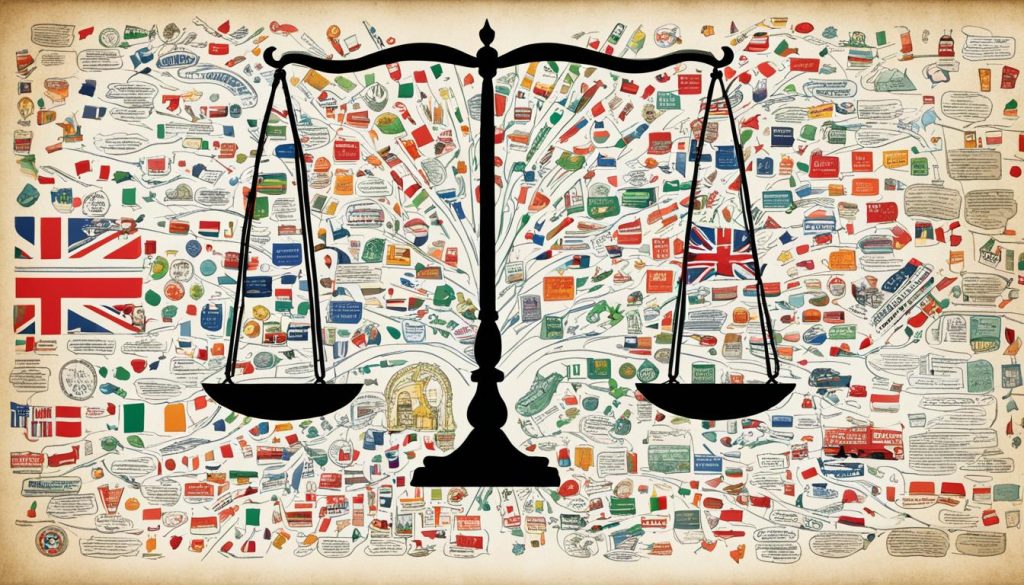
The UK and Ireland’s legal systems have different paths, particularly in company law and the effect of EU rules. Looking at company law in both places shows how laws influence the business world. Ireland’s stance in the EU after Brexit brings unique rules for businesses to follow.
UK Company Law vs. Irish Company Law
UK and Ireland’s company laws aim for clear and effective markets but differ in practice. We’ll look into how each country’s laws compare for those interested in the legal foundations of business in these countries.
| Aspect | UK Company Law | Irish Company Law |
|---|---|---|
| Company Formation | Simpler process due to streamlined online registration | Requires more documentation, influenced by EU directives |
| Corporate Governance | Flexible; the ‘comply or explain’ principle | More prescriptive; adherence to EU corporate governance codes |
| Shareholder Rights | Major decisions require a majority vote | Heavily regulated by EU shareholder directives |
| Director Responsibilities | Enshrined in the Companies Act 2006 | Similar responsibilities but with additional EU law considerations |
Impact of EU Regulations on Ireland
EU regulations greatly affect Ireland, especially after Brexit. Being in the EU, Irish companies follow extensive EU rules. This affects how they operate differently from UK businesses.
- GDPR and Data Protection: Irish companies comply with stringent EU data protection laws.
- Consumer Rights: EU consumer protection regulations ensure robust rights for consumers in Ireland.
- Environmental Standards: EU environmental regulations influence business practices in Ireland.
- State Aid Rules: Irish companies are subject to EU state aid rules that limit government subsidies to ensure fair competition.
Evaluating UK and Irish legal systems is essential for cross-jurisdiction businesses. As the UK moves in its own direction, understanding the changing regulations is key for companies.
Cultural Values and Their Impact on Business
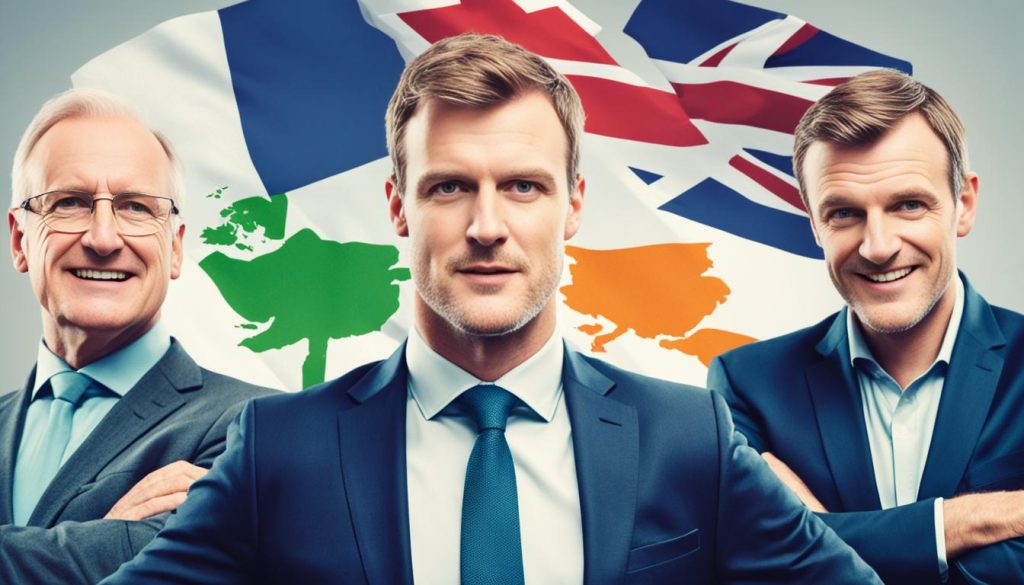
Today’s global economy needs us to understand how cultural values and business mix. The British Isles, though close, have different cultures that affect business. Business communication, hierarchy, and values are key in how companies operate in the UK and Ireland.
Communication Styles in Business Settings
Business talks in the UK are formal and polite. Indirectness and formality are the norm. In Ireland, it’s different. People there value open and personal conversations before business. This shows the importance of connections in Irish business culture.
The Role of Hierarchy in UK and Irish Companies
The UK has a clear corporate hierarchy. Roles are well-defined. Ireland prefers a less rigid system. They like a more equal workplace where everyone’s input matters and leaders are approachable.
Understanding different cultural values in business is key for international success. Companies in the UK and Ireland must recognize and use these differences. This can make partnerships stronger and businesses more successful.
Entrepreneurship and Innovation in the UK and Ireland

The entrepreneurship landscape in the UK and Ireland is rich and changing. It is a great place for startups and new ideas. With strong government help and lots of support networks, these areas are becoming top spots for business and tech growth.
Startup Ecosystems and Support Networks
In the UK, places like London, Manchester, and Edinburgh are full of talent and new businesses. Ireland’s scene is strong too, with Dublin leading with its tech community. Places like Tech Nation in the UK and Enterprise Ireland offer help. They give mentoring and networking to help new businesses grow.
Government Incentives for Business Innovation
The UK and Ireland have many programs to help businesses innovate. These include tax breaks, grants, and funding opportunities. They help ease financial burdens on new companies and support their creative efforts. Below, you’ll see a table with some key government incentives that help startups and innovation grow.
| Country | Initiative | Purpose | Eligibility |
|---|---|---|---|
| United Kingdom | SEIS/EIS | Tax relief for investors | Early-stage startups |
| United Kingdom | R&D Tax Credits | Tax relief for research and development | Businesses engaged in R&D |
| Ireland | Enterprise Ireland’s HPSU | Funding for high potential startups | Startups with significant growth potential |
| Ireland | Knowledge Development Box | Reduced tax on profits from R&D | Companies undertaking R&D in Ireland |
Entrepreneurs in the UK and Ireland find many chances. With innovation incentives and strong startup ecosystems, these nations support economic growth. They aim to be leaders in the global innovation scene.
Compare Business and culture between United Kingdom and Ireland (Redundant Section – Outline Error)

The UK and Ireland have a rich mix of business and culture. They share history but are unique in their ways. This uniqueness affects their businesses and cultures. Understanding these differences and similarities is key. It helps in making cross-border partnerships work and in grasping market behaviors.
When we compare business in the UK and Ireland, we see distinct features. These include how culture affects deals and company culture. Every detail helps us get the full picture of how they do business together.
- Unpacking the values that drive business etiquette
- Examining the role of tradition in modern corporate settings
- Investigating the influence of cultural heritage on consumer behaviour
This shows how businesses need to find the right balance. This is crucial when working in or with UK and Irish companies.
| Aspect | United Kingdom | Ireland |
|---|---|---|
| Business Communication | Formal and reserved | Warm and personable |
| Corporate Governance | Shareholder-driven | Stakeholder-inclusive |
| Market Adaptability | Global and diverse | EU-integrated and dynamic |
| Entrepreneurial Spirit | Competitive and innovative | Collaborative and community-focused |
This data gives important insights for those looking to work between the UK and Ireland. It highlights their strengths in business. This knowledge is crucial for navigating the business world effectively.
As remarked by a prominent economist, “Understanding cultural and business practices in the UK and Ireland is tantamount to possessing a key to unlock vast opportunities in these economies.”
We must remember the ongoing changes in these elements. The relationship between UK and Irish business is always evolving. It offers new challenges and opportunities for strategy and adaptation.
Work-Life Balance and Employment Practices
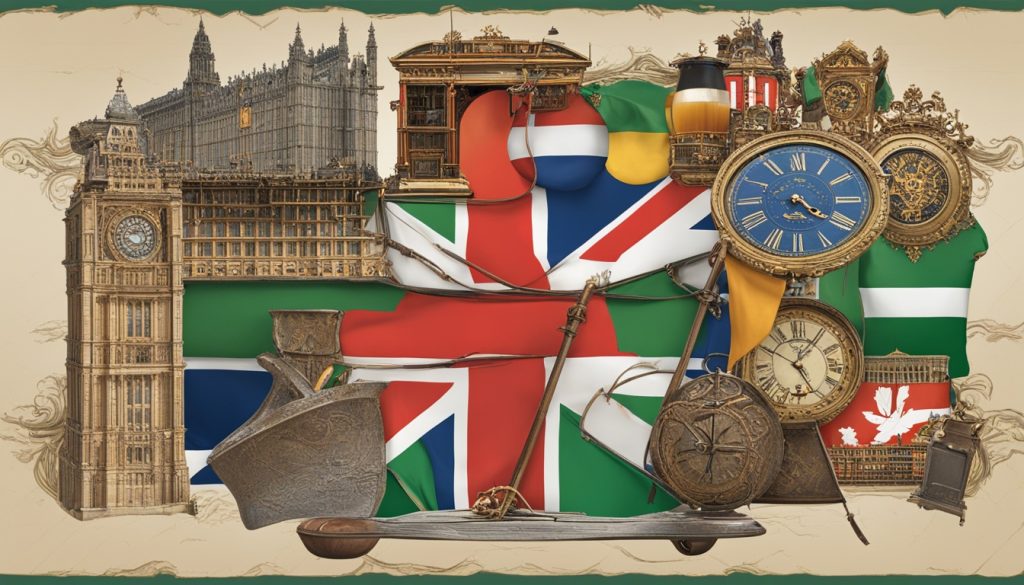
Many are striving for a perfect work-life balance today. It relies on modern employment ideas, valuing rest and flexibility. The UK and Ireland show how they tackle work-life balance, highlighting differences in leave, hours, and remote work.
Annual Leave and Working Hours
The UK and Ireland offer different views on holidays and work hours. Both have tailored the EU’s Working Time Directive to fit their needs. Ireland offers 20 days’ leave plus public holidays, whereas the UK includes public holidays in its 28-day leave. These rules reflect each country’s view on balancing work and life.
Remote Working Adoption Post-Covid-19
Covid-19 greatly pushed the remote work trend. It showed the UK and Ireland how to be more flexible in work. New ways of working have emerged, changing the workplace landscape. This shift has made it easier for many to balance work and life.
Corporate Social Responsibility and Ethics
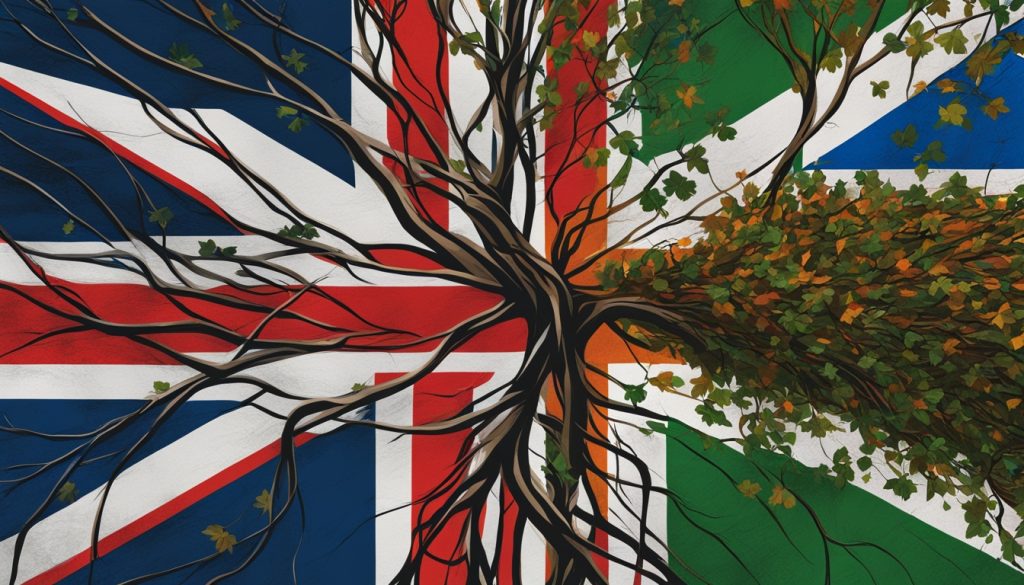
In today’s business scene, we can’t ignore the value of corporate social responsibility and ethics. The UK and Ireland have advanced in this area, each with their unique methods. Their mutual aim is sustainability, fuelled by consumers wanting greener and more responsible companies.
CSR Policies in UK vs. Ireland
The UK leads in making CSR a must for listed firms, requiring them to share their environment and social impacts. In contrast, Irish companies choose to adopt CSR, aiming to match EU and global standards. Despite different laws, companies in both places are embedding ethical practices in their work.
Community Engagement and Sustainability Initiatives
Businesses in both countries are setting examples in sustainability. They’re investing in green energy, cutting waste, and finding new ways to shrink their carbon footprints. They also focus on helping their communities through donations, volunteering, and local collaborations. Despite their different rules, the UK and Ireland share the goal of building a sustainable future together.
Financial Services and Banking Sector

The financial services and banking sectors in the UK and Ireland tell two different stories. We look at London’s role as a top financial hub. We also explore how Ireland’s financial services have grown impressively.
London as a Global Financial Hub
London sits at the core of the world’s finance industry. Despite challenges, it remains a leading financial centre. The City of London is famed for its role in banking, insurance, and investment. It continues to attract big companies and top financial talent.
Ireland’s Growing Financial Services Industry
Ireland’s financial services sector has been expanding rapidly. The country has worked to make a supportive regulatory environment. Being English-speaking and its position post-Brexit has boosted its financial services growth, changing the European financial landscape.
| Criterion | London Financial Centre | Irish Financial Services |
|---|---|---|
| Regulatory Environment | Established, robust, and under UK jurisdiction | EU-regulated with a strong emphasis on growth and innovation |
| Global Market Access | Extensive due to historical and economic significance | Increasing, especially due to the advantages of EU membership |
| Workforce Talent | Highly international with enviable depth in specialist skills | Highly educated, with a growing influx of diverse financial professionals |
| Investment Opportunities | Wide-ranging, from traditional banking to fintech | Dynamic, particularly in fintech, fund management, and green finance |
This comparison between the banking sectors isn’t about finding a winner. It’s about valuing their unique contributions to world finance. London excels with its strong infrastructure. Meanwhile, Ireland is making its mark with innovative financial strategies. Both are striving for excellence in their own ways.
Trade Relations and Economic Partnerships
The UK leaving the EU has led to the need for new trade deals. It’s a big moment for UK’s trade relations. At the same time, Ireland benefits from being in the EU, showing how different their situations are post-Brexit. This time is a chance for both countries to find new ways to trade and use their positions to their advantage.
UK’s Trade Deals Post-Brexit
After Brexit, the UK started making trade deals worldwide. These deals are vital for the UK to become a strong trading nation on its own. Even though making these deals is complex, the UK is making progress in building a range of economic partnerships.
Ireland’s EU Membership Benefits
Being in the EU gives Ireland many benefits. These include easy access to the single market and a say in EU policies. Ireland plays a key role in trade between the UK and the rest of Europe, showing the value of its EU membership.
| UK Trade Agreements | Benefits to UK Economy | EU Trade Agreements | Benefits to Ireland Economy |
|---|---|---|---|
| Comprehensive and Progressive Agreement for Trans-Pacific Partnership (CPTPP) | Increased market access for goods and services to Pacific nations | EU-Canada Comprehensive Economic and Trade Agreement (CETA) | Reduction in tariffs and increased export opportunities for Irish businesses |
| UK-Japan Comprehensive Economic Partnership Agreement | Enhanced cooperation in digital trade and support for UK automakers | EU-Japan Economic Partnership Agreement | Opens door for Irish agricultural exports and services |
| UK-Australia Free Trade Agreement | Eliminates tariffs on UK goods and bolsters job creation | EU-Mercosur Association Agreement | Unlocks trade and investment opportunities in Latin America for Ireland |
Sectoral Strengths and Market Opportunities
The UK and Ireland have made big strides on the world stage. Their technology sectors lead in innovation and growth. The pharmaceutical industry also supports their economy, offering big chances in this area. Let’s get into the exciting future of these key fields.
Technology and Innovation
The technology scene in the UK and Ireland shines with creativity and new ideas. Places like London’s Silicon Roundabout and Dublin’s Silicon Docks are perfect for startups and big companies. Their strength and speed show they’re ready for growth and investment, appealing to those looking for great chances.
Pharmaceuticals and Life Sciences
The UK and Ireland are known for their top-notch drug research and development. Ireland has a strong drug sector with good tax rates and talented workers. The UK is famous for starting new medical treatments, attracting investment. These factors make them leaders in the health market worldwide.
| Industry Sector | United Kingdom | Ireland |
|---|---|---|
| Technology & Innovation Centres | London, Cambridge, Manchester | Dublin, Cork, Galway |
| Key Tech Focus Areas | FinTech, AI, Cybersecurity | SAAS, IoT, Cloud Computing |
| Pharmaceutical Strengths | Drug Development, R&D Facilities | Manufacturing, Export |
| Employment in Pharma | Approx. 70,000 | Approx. 50,000 |
Challenges Faced by Businesses Operating Internationally
UK and Irish firms face big challenges when they go global. They need strong management skills to deal with taxes and cross-border trade. Mastering international rules is key to doing well abroad.
Navigating Different Tax Systems
Understanding different tax systems is tough for businesses going global. They must learn each country’s tax laws to avoid problems. This knowledge helps them save on taxes and follow local rules.
Cross-Border Trade and Supply Chain Management
Cross-border trading is tricky. Firms must handle tariffs and customs rules. Plus, they have to ensure goods move quickly and legally across borders.
This needs a team effort, including legal help and good planning. UK and Irish companies must learn a lot to grow internationally. They’ve got to be smart and fast to succeed abroad and make profits.
Education and Workforce Development
Looking at the UK and Ireland’s education systems gives insight into preparing for today’s job market. Each country is known for its excellent schools. They aim to build a strong workforce by different methods.
Comparing Educational Approaches and Talent Pools
The UK is famous for encouraging students to learn on their own and think outside the box. Ireland focuses on working together and practical learning. Both countries have skilled people ready for work, showing that their education fits different jobs well.
Skillset Demands in Evolving Markets
As jobs change, so does the need for new skills. The UK and Ireland added more STEM subjects. This change is to keep up with the tech world. It’s crucial for preparing workers for what is coming next.
| UK Education System | Ireland Education System | |
|---|---|---|
| Approach to Learning | Independent, Diverse Subjects | Collaborative, Practical Engagement |
| Core Focus Areas | Liberal Arts, Science & Technology | Business, Technology & Applied Sciences |
| Graduate Skillsets | Innovative Thinking, Problem Solving | Teamwork, Industry-Specific Skills |
| Workforce Development | Adaptable, Broadly Skilled Graduates | Specialised, In-Demand Skillsets |
Both the UK and Ireland have plans to keep their workforce strong. They aim to meet the future needs of jobs. This will help them stay competitive in the world economy.
Cultural Festivities and Their Influence on Business Cycles
In the UK and Ireland, cultural festivals greatly shape business cycles. Events like Christmas and Easter boost spending in retail and tourism. This leads to noticeable changes in how businesses perform.
These festivals create demand that influences commercial trends. Businesses see big sales during these festive times. It shows how important these cultural events are to the economy.
Christmas and Easter are key times for businesses. They prepare extra staff and stock to meet the high demand.
The tourism industry gets a boost from these festivities too. Visitors come to experience local cultures, helping the economy. These celebrations are now key parts of the UK’s and Ireland’s economic life.
- The run-up to Christmas sees heightened retail activity as gift purchases escalate.
- Easter often coincides with the onset of tourism season, infusing the economy with fresh vigour.
- National days such as St. Patrick’s Day in Ireland open floodgates for thematic marketing and countrywide festivals.
To sum up, cultural celebrations and the economy are closely linked. They’re more than just fun; they’re essential for the UK and Ireland’s economic health.
National Identity and Branding in Global Markets
Global commerce is booming and national identity greatly impacts branding for UK and Irish businesses. With so many products out there, a brand’s origin can really sway a shopper’s choice. Brands that tap into ‘Britishness’ or ‘Irishness’ stand out, attracting customers who value authenticity and heritage.
Leveraging ‘Britishness’ and ‘Irishness’
‘Britishness’ brings to mind tradition, quality, and reliability. This has helped British firms like Burberry, Jaguar, and Twinings become global favourites. They offer a touch of luxury and history. ‘Irishness’, linked to friendliness and natural quality, helps brands like Guinness and Waterford Crystal stand out. These identities tell a story, turning products into symbols of culture and history.
Country of Origin Effect on Consumer Behavior
UK and Irish companies must understand how ‘country of origin’ affects consumer views. This effect can influence buyers and even loyalty towards a brand. By showcasing their national identity, businesses can make their brand unique. They can shape customer behaviour with marketing that highlights their country’s positives.
In the end, national branding and ‘country of origin’ are key for UK and Irish firms in global markets. By blending their national identity into their brand tales, they connect deeply with global customers. This can boost growth and secure their global standing.
















